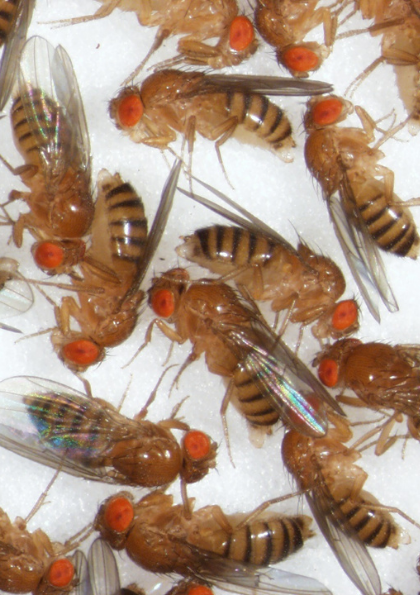
Out of millions of species which inhabit this planet, biological research concentrates around a few organisms. The fruit-fly, Drosophila melanogaster, is one of them. Drosophila melanogaster has 100+ years of research history and reveals amazing life changing stories! This tiny little fruit-fly has helped us understand mysteries around heredity, human diseases, adaptation, speciation, and climate change consequences.
An arm of Drosophila research is increasingly becoming important in the modern world. For the last several years (including my lab), Drosophila has been used as a model to understand how organisms respond to a changing environment. If you are wondering, why should we learn from a tiny fruit-fly, wait for it and hear what Drosophila has to tell you. HOW Lab at the Biological and Life Sciences Division, School of Arts and Sciences uses Drosophila species as model organisms to understand ‘Organismal responses to climate change’. Metabolic rates are fundamental to biological systems that govern most observed patterns in organismal ecology. The thermal sensitivity of physiological rates (i.e. metabolic rate) is one of the most significant characteristics of all organisms. It is especially important in ectotherms, which frequently have a more limited scope for thermoregulation than do endotherms and so are more susceptible to changing environmental temperatures. The unprecedented rates of climate changes in the future, coupled with land use changes that impede gene flow, can be expected to disrupt the entire ecology of many insect species. At the physiological level, we could argue that the entire metabolic machinery of an organism is going to be affected. Warmer temperatures (mediated through metabolic machinery) associated with climate changes will tend to influence (and frequently amplify) insect species' population dynamics directly through effects on survival, generation time, fecundity and dispersal. In HOW Lab, we are studying metabolic responses to climate warming. We live in an era which is experiencing rapid changes in global temperatures. It is important to understand how climatic variation will affect growth, reproduction, and survival of species. To study these processes across multiple generations of individuals with proven genetic tools, Drosophila offers an extra edge (e.g. egg to adult in just 9-11 days at 25°C).
Drosophila research also plays an important role in technological transfer to other arthropod models, opening the window to biodiversity resources and macro-evolutionary scale. It has also been successfully integrated in teaching subjects as diverse as genetics, development, physiology, behaviour, ecology and evolution. For example, I take my students to the field to collect Drosophila species from their natural habitats and bring them to the lab and start teaching them right from the beginning, i.e., identification, maintenance of live organisms, basic genetics, physiological assays (measuring metabolic and water loss rates), artificial selection (selecting flies for a particular trait), and genomics (identification and characterization of genes). The applications are endless. This is something where students can see the amalgamation of their text-book knowledge with organisms in real-time.
The success of Drosophila research is dependent on the community of Drosophila researchers, or flyfolk. Being a part of the Drosophila community, I have several advantages like sharing reagents, strains, and ideas across the continents. This co-operation is the real ‘message’ of the research done in Drosophila biology over the past 100+ years. What did we get out of it, you might ask? Friends of the fruit-fly, this Drosophila community has grabbed 6 Nobel prizes in physiology so far (1933-2017). Drosophila asks, “Want to be my friend?”


